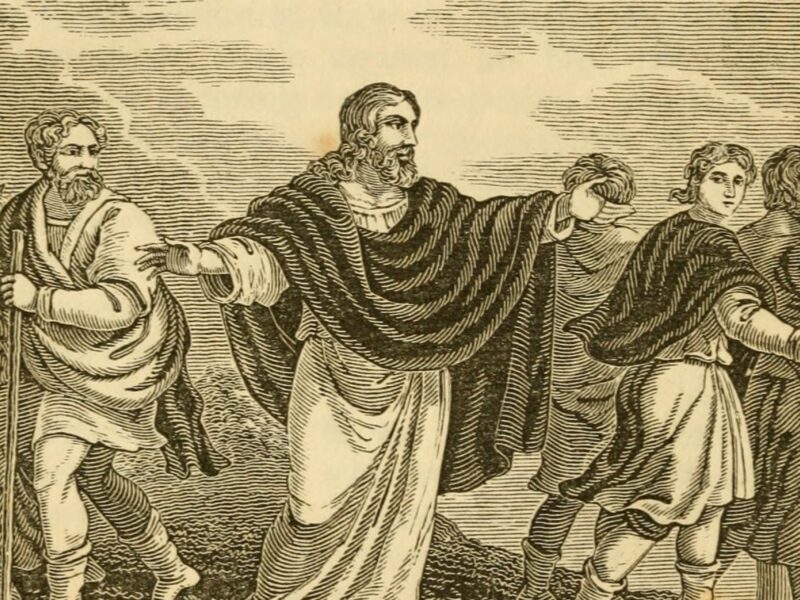
The Joy and the Sorrow
Third Sunday of Advent (Gaudete Sunday). Fr Richard Ounsworth calls for an authentic Christian joyfulness.
Pregnancy is always an anxious time. There is joy, one hopes, the delightful prospect of a child coming into the world, but also certainly anxiety, even fear. And this is rightly so, for never has a child been born who did not, for some reason or other, bring pain and sorrow into the hearts of his parents.
This includes the Blessed Virgin and her only child, Jesus. At the Annunciation, the Angel Gabriel greets her with the word ‘Rejoice’; later she will tell her cousin Elizabeth ‘My spirit rejoices in God, my Saviour.’ And when the child is born, the shepherds are told by the same Angel ‘I bring you good news of great joy’.
And yet the first reaction both of Our Lady and of the shepherds is fear; they need to be told by Gabriel not to be afraid. And they fear with good reason. As Simeon will say to Mary, ‘A sword will pierce through your own soul also.’ We celebrate with good reason a day devoted to Our Lady of Sorrows, and we may well imagine that the joy and delight that her son must have brought to her were often intermingled with sorrow, fear, incomprehension.
Today we are also commanded to rejoice. This day is called Gaudete Sunday after the first word of the entrance antiphon, which echoes the words of St Paul in our second reading. The first reading too commands us to ‘sing aloud’ and ‘rejoice with all your heart’. And as Christians in possession of the Good News of the salvation that comes to us in Christ we naturally want to rejoice. As fr Mark told us in last week’s sermon, the opposite of a Christian community is a sad community.
But do we not also want to avoid the rather embarrassing image with which certain kinds of Christianity are often portrayed? I mean what some people, perhaps rather unkindly, call ‘happy clappy’ Christianity. We certainly don’t want people to think that our joy is something shallow, a thin veneer of grinning cheer that papers over all the sadnesses of life, an empty, unthinking or self-deceiving joy. The joy of a Christian must be an authentic joy, a joy that goes all the way down — all the way down to the depths of sadness, indeed.
This means that true Christianity faces the reality of the world in all of its sadnesses head on. More than that, it means that our Christian duty is to search out the causes of sorrow, including most especially our own sins and weaknesses that cause such deep pain to those we love, and to those we have never met but are called to love in Christ.
It means seeking out those whose lives are blighted with deep sadness and standing alongside them in solidarity. This is not to say that we should try to cheer them up with words of shallow comfort, but rather that we should enter into their sadness, share in their griefs, suffer with them — that is what the word ‘compassion’ means, after all. And we do so knowing that it is we who are privileged, rather that doing them any favours, because it is to such as these that the Kingdom of Heaven belongs. Only in Christianity do we believe, and perhaps begin to understand, the paradoxical teaching that ‘happy are those who grieve’.
They are happy because they shall be comforted. But this comfort itself is not without its pain. After all, it is the same birth of Christ that Gabriel proclaimed as a message of joy which also Simeon rightly predicted would bring to his mother the pain of a broken heart.
And in today’s Gospel, in which we learn that the people are ‘in expectation’ — pregnant themselves, as it were, with the hope of Israel — John the Baptist heralds the coming of Christ in very frightening terms. He speaks of Christ coming to harvest the people and make of the chaff an everlasting bonfire. The coming of Christ in which we rejoice today is no shallow, two-dimensional happy fairy tale. When the Son of David comes into the world, his birth will bring pain as well as joy.
But it is through the often painful harvesting of our souls that we begin to undergo in this life that we can enter into the true, deep, lasting joy of our Saviour. He came and dwelt among us to enter into our sorrow; he made that journey into the broken heart of human darkness. He came to lead us out of that darkness, into the eternal joy he shares with the Father and the Holy Spirit, now and forever.


